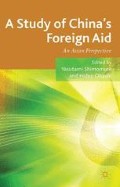Abstract
From the outset, China has been characterized as a ‘new donor’ but it is by no means a ‘new’ provider of aid. Since its founding as a leader of the ‘third world’ and of ‘the non-aligned countries’, it has assisted the newly independent nations from a political standpoint. China has also provided considerable aid to Africa, as exemplified in particular by the TAZARA railway between Tanzania and Zambia, a historically famous aid project of the 1960s that China supported with all its might. But in the 1970s and 1980s the main concern of the international community was aid to China, as the country was then embarking on its path of economic reform, and an open door strategy.
Access this chapter
Tax calculation will be finalised at checkout
Purchases are for personal use only
Preview
Unable to display preview. Download preview PDF.
References
Brautigam, D. (2009). The Dragon’s Gift: The Real Story of China in Africa. Oxford: Oxford University Press.
Campos, I., and A. Vines (2008). ‘Angola and China: A Pragmatic Partnership’. CSIC Working Paper. Washington, DC: Center for Strategic and International Studies. Available at: www.csis.org/files/media/csis/pubs/080306_angolachina.pdf.
Halper, S. (2010). The Beijing Consensus: How China’s Authoritarian Model will Dominate the Twenty-first Century. London: Basic Books.
Human Rights Watch (2010). Transparency and Accountability in Angola: An Update. Available at: www.hrw.org/reports/2010/04/13/transparency-and-accountability-angola-0
Inada, J. (2013). ‘Angola ni Miru Funnsougo Fukkou Shien no Kadai to Kyoukun’ (The Lessons and Challenges of Assistance to Post-conflict Reconstruction in Angola). In: N. Suzuki and A. Noguch (eds), Henbousuru Gendai Kokusai Keizai (The Changing Contemporary International Economy), Senshu University Press.
IFC (2010). Doing Business: 2010 Annual Report.
Information Office of the State Council (2010). Economic and Trade Cooperation between China and Africa.
Information Office of the State Council (2011). China’s Foreign Aid.
Kobayashi, T. (2008). ‘Evolution of China’s Aid Policy’. JBIC Institute Working Paper, 27. Tokyo: Japan Bank for International Cooperation Institute.
Leokowitz, L., M. McLellan Ross, and J. R. Warner (2009). The 88 Queensway Group: A Case Study in Chinese Investors’ Operations in Angola and Beyond. U.S.China Economic & Security Review Commission.
Li, R. (2008). Institutional Sustainability and Economic Development: Development Economics Based on Practices in China. Beijing: China Economic Publishing House.
Ministry of Commerce, National Bureau of Statistics, State Administration of Foreign Exchange (2009). Statistical Bulletin of China’s Outward Foreign Direct Investment.
Moyo, D. (2009). Dead Aid: Why Aid is Not Working and How There is Another Way for Africa. London: Penguin Books.
Michel, Serge et Michel Beuret (2008), La Chinafrique, Grasset & Fasquelle.
Suehiro, A., K. Ooizumi, N. Sukegawa, K. Nunota, Y. Miyajima (2011). Chugoku no Taigai Bouchou to Dai Mekon Ken (GMS/CLMV (Chinese Expansion and Great Mekong Sphere (GMS/CLMV). Institute of Social Science, University of Tokyo.
Transparency International (2011). Corruption Perceptions Index (CPI). Berlin: Transparency International.
Vines, A., L. Wong, M. Weimer, and I. Campos (2009). Thirst for African Oil: Asian National Oil Companies in Nigeria and Angola. London: Chatham House Report.
World Bank (2005). Interim Strategy Note for the Republic of Angola. Washington, DC: World Bank.
World Bank (2008). Angola: Perspectives on the Financial Crisis. World Bank Angola Office.
World Bank (2008). The Economy of Angola: Where to Go From Here? World Bank Angola Office.
Yoshida, E. (2010). ‘Africa niokeru Chuugoku no Keizaishinshutu’ (Chinese Economic Advancement in Africa). Chugoku no Africa oyobi Oceania niokeru Purezensu (Chinese Presence in Africa and Oceania). Report to the Ministry of Defense of Japan, The Research Institute of Peace and Security.
Author information
Authors and Affiliations
Editor information
Editors and Affiliations
Copyright information
© 2013 Juichi Inada
About this chapter
Cite this chapter
Inada, J. (2013). Evaluating China’s ‘Quaternity’ Aid: The Case of Angola. In: Shimomura, Y., Ohashi, H. (eds) A Study of China’s Foreign Aid. Palgrave Macmillan, London. https://doi.org/10.1057/9781137323774_6
Download citation
DOI: https://doi.org/10.1057/9781137323774_6
Publisher Name: Palgrave Macmillan, London
Print ISBN: 978-1-349-45878-3
Online ISBN: 978-1-137-32377-4
eBook Packages: Palgrave Economics & Finance CollectionEconomics and Finance (R0)

